| | Type | Category | Supplier | |
|---|
| |
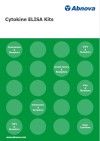 | Abnova Cytokine ELISA Kits Product Lists |
Documents | ELISA | Abnova Corporation | |
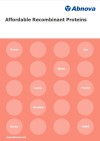 | Abnova Affordable Recombinant Proteins Product Lists |
Documents | Proteins | Abnova Corporation | |
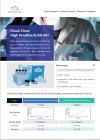 | Cloud-Clone High Sensitive ELISA Kits have more advantages in terms of sensitivity, ideal when the concentration of target analyte is too low to measure, such as low level cytokines. |
Documents | ELISA | Cloud-Clone Corp. | |
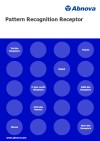 | Pattern recognition receptors (PRRs) are crucial for detecting invading pathogens and initiating the innate and adaptive immune response. There are various families of PRRs including the Toll-like receptors (TLRs), C-type lectin receptors (CLRs), NOD-like receptors (NLRs), RIG-I like receptors (RLRs), and AIM2-like receptors (ALRs). Abnova provide 142 Antibodies, 55 Proteins, and 9 ELISA Kits targeting pattern recognition receptors. |
Documents | Immunology | Abnova Corporation | |
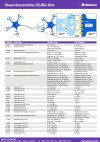 | ELISA Kits from Abnova targeting Neurotransmitters including 5-hydroxyindoleacetic acid, Dopamine, Epinephrine, GABA, Glutamate, Histamine, Kynurenine, Metanephrine, Norepinephrine, Serotonin, and Tryptophan. |
Documents | Neuroscience | Abnova Corporation | |
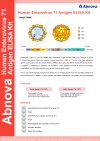 | Enterovirus 71(EV71), a non-enveloped and icosahedral single-stranded RNA virus, belongs to family Picornaviridae, genus Enterovirus, species Human Enterovirus A (HEV-A). It is one of the major etiological agents causing hand, foot, and mouth disease (HFMD), which generally affects infants and young children. In addition to HFMD, EV71 epidemic has resulted in many fatalities because of serious neurological complications and has been identified as a serious threat to public health. Abnova has developed high quality Human Enterovirus 71 Antigen ELISA Kit for the qualitative detection of Human Enterovirus 71 Antigen in serum, plasma, cell culture supernatants, cell lysates, tissue homogenates. |
Documents | Virology | Abnova Corporation | |
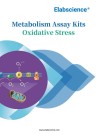 | Elabscience have developed a series of Metabolism Assay Kits to meet the requirements of researchers, yielding efficient detection of biochemical indicators. |
Documents | Metabolism | Elabscience | |
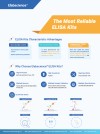 | Contents: ELISA Kits Characteristic Advantages, Why Choose Elabscience® ELISA Kits, MS ELISA Kit Product Features, QuicKey Pro™ ELISA Kit Product Features, Top-30 Selling ELISA Kits, and High IF Literature. |
Documents | ELISA | Elabscience | |
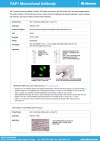 | YAP1 encodes the human ortholog of chicken YAP protein which binds to the SH3 domain of the Yes proto-oncogene product. This protein contains a WW domain that is found in various structural, regulatory and signaling molecules in yeast, nematode, and mammals, and may be involved in protein-protein interaction. |
Documents | Antibodies | Abnova Corporation | |
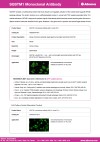 | SQSTM1 encodes a multifunctional protein that binds ubiquitin and regulates activation of the nuclear factor kappa-B (NF-kB) signaling pathway. The protein functions as a scaffolding/adaptor protein in concert with TNF receptor-associated factor 6 to mediate activation of NF-kB in response to upstream signals. Alternatively spliced transcript variants encoding either the same or different isoforms have been identified for this gene. Mutations in this gene result in sporadic and familial Paget disease of bone. |
Documents | Antibodies | Abnova Corporation | |
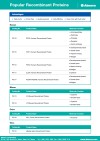 | High purity, Animal free, Quality assured, Cost-effective, Save more with bulk order. Abnova, March 2023 |
Documents | Proteins | Abnova Corporation | |
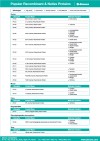 | High purity, Animal free, Quality assured, Cost-effective, Save more with bulk order. Popular Recombinant & Native Proteins from Abnova, April 2023 |
Documents | Proteins | Abnova Corporation | |
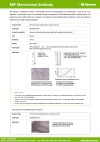 | MIF encodes a lymphokine involved in cell-mediated immunity, immunoregulation, and inflammation. It plays a role in the regulation of macrophage function in host defense through the suppression of anti-inflammatory effects of glucocorticoids. This lymphokine and the JAB1 protein form a complex in the cytosol near the peripheral plasma membrane, which may indicate an additional role in integrin signaling pathways. |
Documents | Antibodies | Abnova Corporation | |
 | Datasheet for product P0001015 |
Documents | Datasheets | AddexBio | |
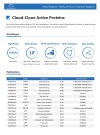 | Cloud-Clone Active proteins based on GMP level development, can provide a variety of specifications of protein, to meet the needs of basic science experiments, drug screening, animal drug delivery and other experiments. High Purity, Multi-species, Multi-specifications, Multi-detections |
Documents | Proteins | Cloud-Clone Corp. | |
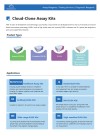 | After 14 years of development and technology accumulation, Cloud-Clone has developed ELISA kit and CLIA kit based on enzyme linked immunoassay technology. 8,000+ kinds of high quality assay kits covering 2,000+ indicators and 10+ species are designed to assist your experimental research. Includes Sandwich ELISA Kit, Competition ELISA Kit, CLIA Kit, Antibody ELISA, Mini ELISA, Instant ELISA, High-sensitive ELISA, Wide-range ELISA. |
Documents | ELISA | Cloud-Clone Corp. | |
| How do you operate ELISA kits and get a satisfactory test result? What precautions should be paid attention to?
Check this video recorded in ELK Biotechnologys lab! |
Videos | ELISA | ELK Biotechnology | |
| ELISA experiment operation video |
Videos | ELISA | ELK Biotechnology | |
| ELK Biotechnology CO., LTD is manufacturer of ELISA kits, Molecular biology products and Antibodies. |
Videos | | ELK Biotechnology | |
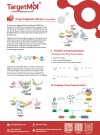 | Through structural analysis and screening of 2342 marketed drugs and 1487 clinical phase drugs, TargetMol has constructed a Drug-Fragment Library consisting of 1159 fragments. |
Documents | Small Molecules | TargetMol | |
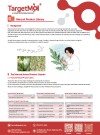 | A broad and diverse herbal source is an important guarantee for a high-quality Natural Product Library. TargetMol has collected massive relevant information of nearly 10,000 natural product monomers and numerous plants in 196 families, 887 genera. We can be a great help for you to search your desired compounds according to plant classifications. |
Documents | Small Molecules | TargetMol | |
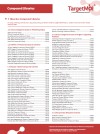 | List of compound libraries available with TargetMol |
Documents | Small Molecules | TargetMol | |
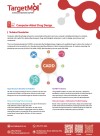 | |
Documents | | TargetMol | |
 | Products & Services: Compound Libraries, Inhibitors & Agonists, Reagent Kits, Compound Synthesis, CADD and Recombinant Proteins. |
Documents | Supplier Introduction | TargetMol | |
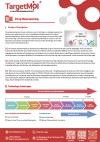 | Drug repurposing, also known as the new use of old drugs, is a strategic approach to discover new applications for old or investigational drugs beyond their original approved applications. While the development of new drugs is a process with a high failure rate, high cost, and slow pace, repositioning old drugs for common and rare diseases is becoming increasingly attractive because of the advantages of low R&D costs and short development time.
|
Documents | Small Molecules | TargetMol | |